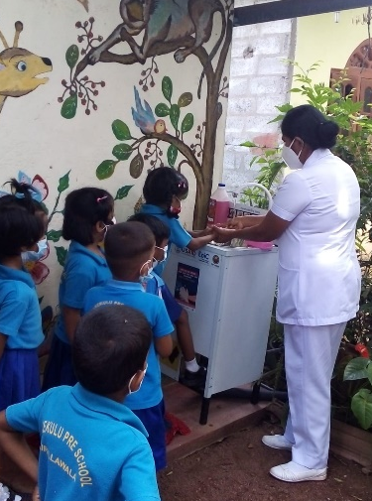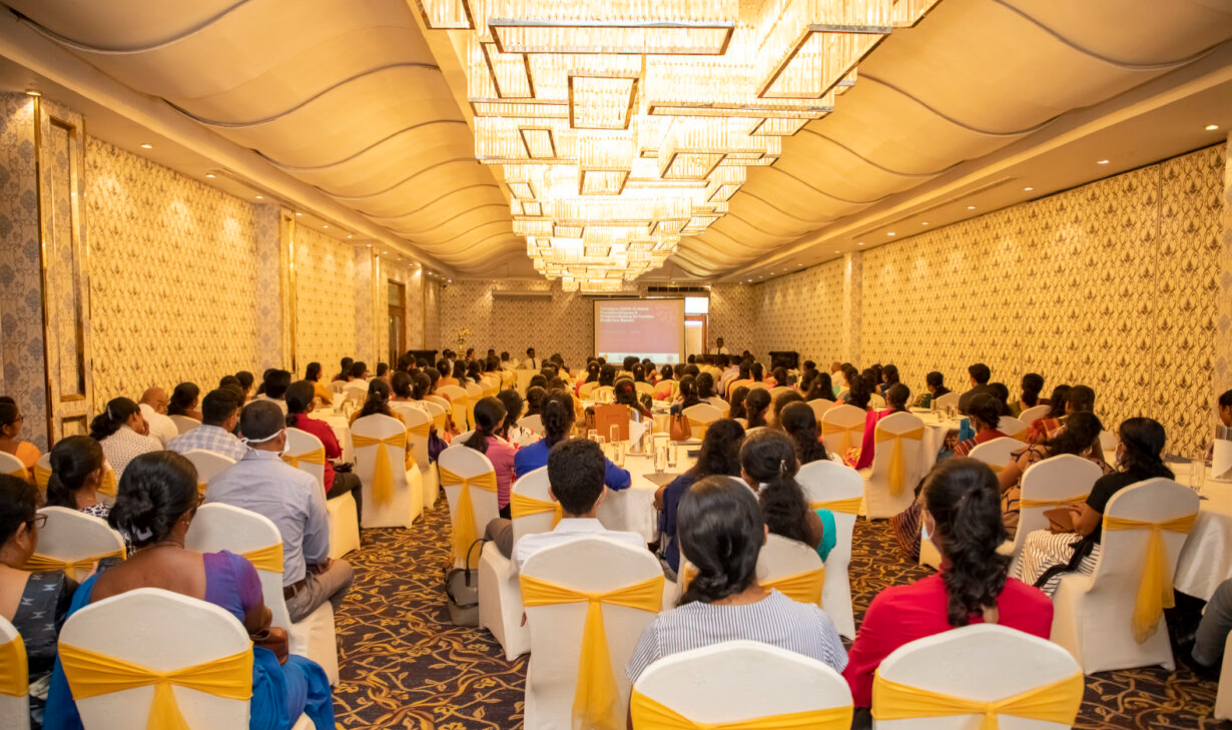Dr. Dayanath Ranatunga, EpiC Sri Lanka
Dr. Harini Fernando, EpiC Sri Lanka
The COVID-19 pandemic affected every aspect of society and placed great strain on the health workforce. The Meeting Targets and Maintaining Epidemic Control (EpiC) project in Sri Lanka strategically designed and implemented several cross-cutting interventions to strengthen the health system amidst political and economic turmoil. This required agility, resourcefulness, and resilience by EpiC staff and local stakeholders. By improving psychosocial support among health workers and strengthening community engagement, Sri Lanka’s capacity to respond and recover from the effects of COVID-19 goes beyond the public health emergency and towards a future of sustainable resilience.
Managing burnout and building resilience
The prolonged COVID-19 pandemic led to widespread burnout among frontline health care workers in Sri Lanka. The overwhelmed health care system was at a point of collapse when the EpiC project rolled out an initiative to build resilience and manage burnout among these health care professionals.
The initiative began in the Colombo Metropolitan Region, including the hardest hit districts of Colombo, Gampaha, and Kalutara. EpiC trained 327 frontline health professionals (including doctors, nurses, social workers, and occupational therapists), 308 mental health personnel, 60 Suwa Seriya ambulance staff, and all mental health hotline employees to manage burnout, foster resilience, and address COVID-19 associated psychosocial challenges. Instruction in basic counseling, preventing suicide, fostering team unity, and handling aggressive or advanced patient situations was also provided. In collaboration with the Sri Lanka College of Psychiatrists, handbooks and instruction manuals were developed and disseminated. To reach additional health care workers, a train-the-trainer program was implemented in Colombo and Kandy for 90 psychiatrists from various parts of the country. This was expanded to all provinces in Sri Lanka, reaching a total of 2,124 frontline responders from across the nation.
Participants appreciated that the training sessions offered a practical approach to managing uncertain and unpredictable scenarios, while preserving their well-being amidst stress at work and home. Most agreed that the lessons learned during the sessions would be put into practice in their daily activities moving forward.
“Our mental health is something we neglect a lot; this allowed us to better understand how we can maintain a better mental well-being and in turn interact with patients better.”
“Our hospital was declared a COVID hospital for the past few years, and we were extremely stressed about taking back the virus to our families. Also, with the upheaval in the country, the family stressors were further amplified, so we really suffered during that time. This has enabled us to manage these stressors and seek assistance when needed.”
Community volunteer teams mobilized to support COVID-19 prevention
To build local capacity for community health and preventive actions, EpiC launched a risk communication and community engagement (RCCE) project in the Western province of Sri Lanka that included Colombo, Gampaha, and Kalutara — three of the nation’s districts with the highest burden of COVID-19 cases. Sarvodaya, a leading developmental organization in Sri Lanka, led the project and revived a local community volunteer model that had been disrupted by the introduction of centralized pandemic protocols. The project directly involved neighborhoods in infection prevention and control (IPC), as well as risk communication. In collaboration with Sarvodaya, EpiC established 50 community volunteer teams under the “Suwodaya” initiative (a term symbolizing “health awakening”) to lead community health and prevention activities. Suwodaya teams were trained in safe gathering guidelines, safety behaviors, clarification of vaccine misconceptions, and the advantages and importance of vaccination. Four multi-sectoral meetings were held with regional health authorities in the three target districts to introduce the project to officials, establish direct connections with the Suwodaya teams, and to promote the use of these volunteer groups to improve public health.

The Suwodaya teams established 150 communal hygiene stations in high-risk areas across the three districts. They also collaborated with local public health officials to conduct 50 community health drives. The volunteer Suwodaya teams conducted a health clinic in Wedawatta and a medical camp in Mahagama with other funding sources. The Public health institute of Kalutara district conducted a training for Suwodaya team members on diabetes, high blood pressure, body mass index (BMI), and first aid, demonstrating the project’s emphasis on sustainability and self-motivation
Upon the project’s completion, community leaders and members stand ready to promote localized involvement in upcoming health matters. A public health framework has forged alliances with these communities to foster improvements in health. Learn more about EpiC Sri Lanka’s health systems strengthening activities by watching this video.
Featured image: A training on COVID-19 related psychosocial issues and resilience building for frontline health care workers. Photo by EpiC Sri Lanka.

